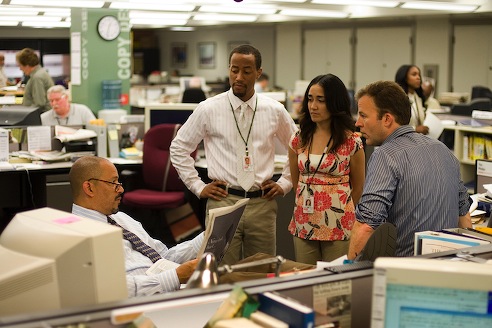Returning series review: The Wire (HBO)
01/04/08 01:45 PM

By ED BARK
Television's second most-underappreciated, Baltimore-set drama series begins its final wind-down this weekend.
HBO's concluding fifth season of The Wire (Sunday, 8 p.m. central on HBO) looks like a lock to end its run without ever receiving a best drama series Emmy, let alone even a nomination.
It has highly distinguished company in NBC's Homicide: Life on the Street (1993-99), which likewise was never deemed a contender by Emmy voters.
Both series did win Peabody Awards, though. They also share the byline of creator David Simon, a former reporter for The Baltimore Sun who grimly sees his city in ways that its Chamber of Commerce never can.
Simon's last 10 episodes of The Wire hit close to his old home. They depict the Sun as increasingly hobbled by buyouts, budget cuts and go-along, get-along suckups. Sound familiar?
None of this sets well with battle-scarred city editor Gus Haynes (Clark Johnson from Homicide), who wonders why no one seems to be spoiling for a good fight anymore.
"You know what a healthy newsroom is?" he asks mechanically. "It's a magical place where people argue about everything all the time."
By Episode 3 the hammer is falling hard again via a "fresh round of buyouts." Or if you prefer, "a voluntary separation plan."
An executive editor is left to do the dirty work mandated by corporate rajahs lacking the guts to confront the dwindling Sun troops in their dirty old slaughterhouse.
"We are quite simply going to have to find ways to do more with less," says The Wire's designated reaper.
Morale is beaten to a pulp at the cop shop, too. Raises are miniscule. Overtime pay is overdue. Equipment and personnel also have taken a series of heavy hits.
It all prompts self-destructive detective Jimmy McNulty (series linchpin Dominic West) to drink harder than ever while desperately fabricating a serial killer thread in hopes of freeing up more manpower to fight and solve crimes.
Newly elected mayor Tommy Carcetti (Aidan Gillen) already has made too many campaign promises, none of which he can fully keep. And on the street, it's still kill or be killed, with baby-faced gang leader Felicia "Snoop" Pearson (played by her ownself) calling the shots and firing some, too.
It's a complex web for the uninitiated and a challenge even for those who have faithfully stuck with The Wire. Given Simon's past inclinations, there's no reason to expect much of anything uplifting. A pot of gold is completely out of the question. Maybe even a spittoon would be asking too much.
Still, The Wire amazes with its gritty attention to detail. It feels so damned real, and from Day One that's been both its blessing and its curse. You don't kick up your feet to watch. Nor do you feel at ease.
In the end -- and now nearing the end -- The Wire wouldn't have lasted beyond its first season on any network other than HBO. Be assured, though, that new audiences will keep finding it. It's too good to ever be entirely forgotten. And there's nothing so bad about that.
